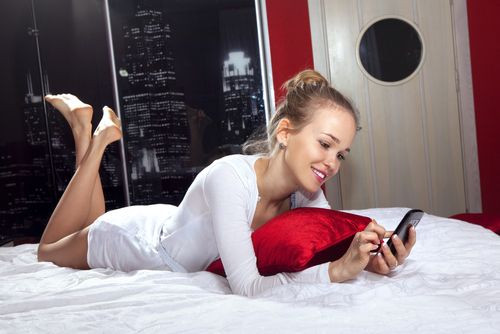Why You Should Disconnect From Your Smartphone After 9 PM: Blue Light Blocks Melatonin, Leads To Poor Sleep And Work Performance

Smartphones have made it possible to keep in touch with anyone 24/7 whenever, wherever. The accessibility to stay connected has facilitated employees to fit work activity into times and places outside of the workplace. While the digital age has aided employees to become more responsive to work demands, ironically, it has also led to unethical behavior at work, cyberloafing, and work injuries. According to a soon-to-be-published study in the journal Organizational Behavior and Human Decision Processes, blue light from a smartphone’s display screen can inhibit melatonin production, leading to a poor night’s sleep, and a decrease in work performance the next day.
The electric lights that illuminate from smartphones, blue light, are believed to be disrupting the nightly release of the hormone melatonin — a sleep aid — while activating neurons that boost alertness. Blue wavelengths, boost attention, reaction times, and mood, but they are the most disruptive at night, according to the Harvard Medical School. The artificial light throws the body’s biological clock — or, the circadian rhythm — out of sync, resulting in the deterioration of sleep quality.
Influenced by light, circadian rhythms have an average length of 24 and one-quarter hours. The daylight helps keep a person’s body clock aligned with the environment. People who stay up late are more likely to have a slightly longer circadian rhythm, while those who are “early birds” fall below the 24-hour mark.
Christopher M. Barnes, Klodiana Lanaj, and Russell Johnson, a team of researchers at the University of Washington, have shed light on the effects smartphone use has on sleep and work engagement the next day. The researchers conducted two studies to observe if using smartphones after 9 p.m. would more negatively affect sleep, and in turn, leave people feeling tired in the morning, affecting their performance. They specifically wanted to see if employees who used smartphones to do a bit more work at night would ironically be more disengaged at work the next day due to lost sleep.
Eighty-two mid- to high-level managers were asked to complete multiple surveys per day for two weeks in the first study. The researchers conducted a “within persons” analysis, which means they compared each participant’s daily data only to that person’s own data on other days. The findings proved to be consistent with the researchers’ hypothesis that late-night smartphone usage affected sleep, and as a result, made employees less engaged at work the next day.
In the second study, 161 employees were recruited from a variety of occupations, including both managers and non-managers, to complete the same set of surveys. However, the researchers added the addition of measures of late-night usage of TV, laptop computers, and tablets, according to the Harvard Business Review Blog Network. The harmful effects of smartphones on the participants’ sleep and work performance were seen even after the researchers accounted for the other electronic devices. Smartphones were associated with the most powerful effects compared to the other devices.
“There are downsides to having employees use smartphones — direct ones for the employees and less direct but still troubling ones for workplaces. Smart managers will look for creative ways to minimize the problems without giving up the mutual benefits of smartphones,” the researchers wrote in their blog post.
These two studies further support the American Medical Association’s policy recognizing "that exposure to excessive light at night, including extended use of various electronic media, can disrupt sleep or exacerbate sleep disorders, especially in children and adolescents."
While it may seem impossible that employers will rely less on smartphones to communicate with their employees, Leslie Perlow, a Harvard professor, offers a possible solution. She believes employees should have a predictable time off, meaning they should agree that evenings and normal sleeping hours are the most important times to disconnect from smartphones. Doing so will allow employees to psychologically disengage from work and reduce their exposure to blue light.
Employers who wish to increase work productivity in the office can also become part of the solution. The authors of the study suggest for the creation of new norms as to when employees are expected to respond to work email and when they are not. Rather than having employees feel pressure to check their emails late in the evening, Barnes and colleagues believe employers should set a delivery delay such that it can arrive the next morning. “With this approach, managers who are traveling or working odd hours can still communicate at their convenience but minimize the negative effects on others,” the researchers said.
Smartphone users are reminded to not let their devices decide when it’s time for lights out.



























